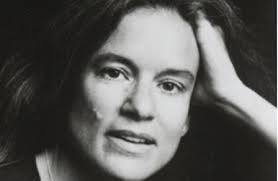
Exposé. Tell-all. First-person confessional. As Exhibit A I give you one of Sharon Olds’ more memorable poems, “I Go Back to May 1937.”
The title is, admittedly, a bit clunky, but there’s no doubting that readers read on when a poet is going to reveal her mom and dad’s mistakes—starting with herself. Only, according to Olds, it may actually be the one thing they got right. After all, without Sharon, who would be here to explain what went wrong?
So Olds imagines a time before she existed. A time when her parents were in the prime of life during college. But there’s a catch. What works well for a body (youth) may not work as well for judgment: “they are about to graduate, they are about to get married, /
they are kids, they are dumb, all they know is they are / innocent, they would never hurt anybody.”
With the gift of hindsight, however, Olds knows that each is the wrong person for the other, and wonders if, given a time machine, she’d have the courage to tell them as much before it is too late.
This is when selfishness kicks in. This is when the proverbial lust for life enters like a deus ex machina to rescue the poet from her own imagination.
“I want to live,” Olds admits, and so all second thoughts are buried. The advantage of the poem, then, becomes the simple, unfulfilled act of saving the parents from their own indiscretions. The other advantage? This story could apply to many young couples who didn’t know better but did what humans do best: proceed anyway.
Yep. That’s it: Life as procession anyway. Sometimes that’s all she wrote. Only in Sharon Olds’ case, she wrote more:
I Go Back to May 1937
Sharon Olds
I see them standing at the formal gates of their colleges,
I see my father strolling out
under the ochre sandstone arch, the
red tiles glinting like bent
plates of blood behind his head, I
see my mother with a few light books at her hip
standing at the pillar made of tiny bricks,
the wrought-iron gate still open behind her, its
sword-tips aglow in the May air,
they are about to graduate, they are about to get married,
they are kids, they are dumb, all they know is they are
innocent, they would never hurt anybody.
I want to go up to them and say Stop,
don’t do it—she’s the wrong woman,
he’s the wrong man, you are going to do things
you cannot imagine you would ever do,
you are going to do bad things to children,
you are going to suffer in ways you have not heard of,
you are going to want to die. I want to go
up to them there in the late May sunlight and say it,
her hungry pretty face turning to me,
her pitiful beautiful untouched body,
his arrogant handsome face turning to me,
his pitiful beautiful untouched body,
but I don’t do it. I want to live. I
take them up like the male and female
paper dolls and bang them together
at the hips, like chips of flint, as if to
strike sparks from them, I say
Do what you are going to do, and I will tell about it.